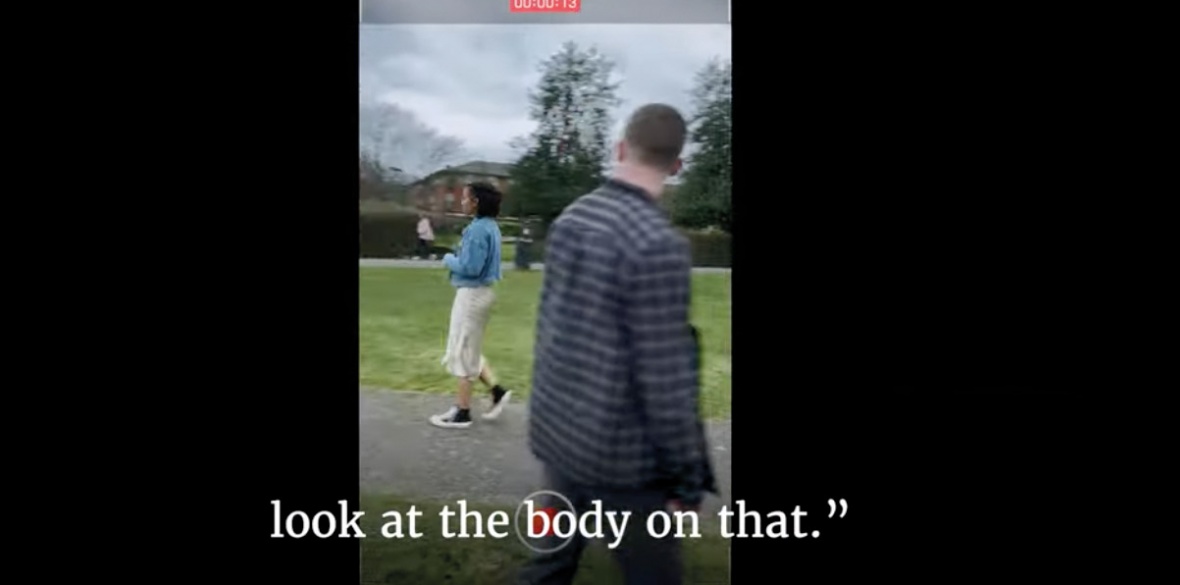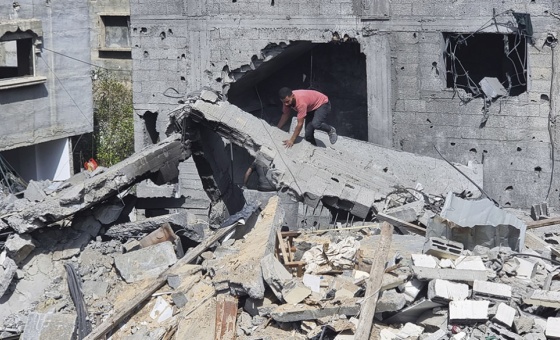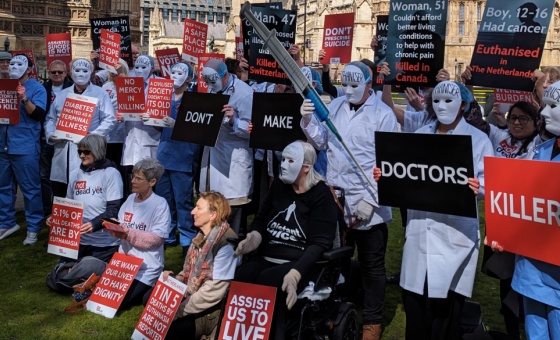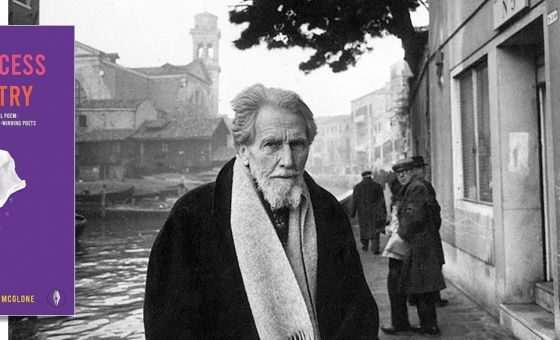This is the last article you can read this month
You can read more article this month
You can read more articles this month
Sorry your limit is up for this month
Reset on:
Please help support the Morning Star by subscribing here
THERE has been quite a flurry of government schemes recently, all claiming to tackle the evil of violence against women and girls.
Some offer a glimmer of hope, most move me to despair. The past week’s “Enough” campaign launched by the rarely sincere Priti Patel turned the air blue in our house.
This continual stream of initiatives calls to mind a cartoon where a body lies unconscious on the pavement, a crowd gathering around, with a lone homeopath elbowing to the front, shouting: “Let me through; I have arnica — and rosemary!”
And not to get lexical here, but why is there invariably a “raft” of initiatives? Far be it from me to invent collective nouns, but I’m proposing a “wazzackry” would be more apt.
Every time some politician announces a fresh “raft,” do remember it’s bugger all to do with a floating craft; it’s a “joblot,” and comes from Middle English, meaning rubbish, as in riffraff. There, that gives you something else to shout at the telly when ministers unveil their transitory solutions.
You’re bound to see the new campaign somewhere; the government has created TV and radio ads, billboards and social media. It aims to tackle street harassment, coercive control, unwanted touching, workplace harassment, revenge-porn and cyber-flashing.
There is a vaguer commitment to communication helping young people to create healthy relationships.
The communications mix has been developed by an advisory board with more than 30 charities, survivors and academics.
That’s laudable enough, though the “written by committee” dynamic shows in the first few seconds of the short film uploaded to YouTube last week.
Show me any teenage boy in a park who shouts: “Look at the body on that,” as a female passes by, and I’ll show you an opening line that was censored when it should have been scrapped.
The main message here is that we’re all responsible for the safety of women and girls, that we can all intervene, and that we should.
The concept is not urging us to take on perpetrators physically; the tone is more of reprimanding wrongdoers and offering support to victims.
This notion that we play a part in policing others’ behaviour is not new. Decades of public information campaigns have focused on the power of peer pressure.
Three years ago, the Coalition of Racial Equality and Rights in Scotland created a poster campaign tackling racist incidents. It came with sensible advice: Talk to the person being victimised, not the culprit; de-escalate the situation, if you know how to; if things escalate, seek support from others, possibly the authorities; always prioritise personal safety for both yourself and the person being victimised; don’t play the hero, just show solidarity and support.
This down-to-earth stuff resonated with the 50 or so women I spoke with last week, in vox pops online and in the street.
One told me: “If I’m being seriously bothered by some bloke when I’m walking home, I don’t care who intervenes — man, woman, anybody. Just don’t leave me on my own!”
A woman in her twenties said: “My grandmother was a proper feminist in the 1960s. She said she always shouted back at the creeps who whistled and shouted stuff at her. But now it happens all over again. I’m sick of it — but I’m too scared to shout back.”
The plethora of schemes and strategies includes government money via the Safer Streets Fund. Some local authorities and police forces get a share from a £23.5m pot.
One London council, Richmond-upon-Thames, has been doing plenty of work. When its bid to the Home Office Safety of Women at Night (SWAN) programme was unsuccessful, it dug into existing budgets, finding £139,000 to deliver its own programme.
Their strategy taking on VAWG (Violence Against Women and Girls) is in the pipeline and should emerge soon. It claims to be based on “plans to deliver the cultural and behavioural shift needed to deliver long-term change in men’s attitudes to women.”
The document is ambitious in its scope, though skewed heavily towards work on domestic abuse.
It’s fair to say that the streets of the “upon-Thames” boroughs may already be safer than many. These leafy, outer London suburbs include Walton-on-Thames, another area known for its tranquil riverside location.
These may not be the places where funding would be deployed to more street lighting, CCTV cameras and extra police patrols. Richmond is the safest area in Greater London, according to data. Our “big crime” here is bicycle theft.
None of the above made a bit of difference to Marsha McDonnell, Amelie Delagrange and Milly Dowler. These young women were murdered by a man now serving life in Frankland prison. (I never say his name; I don’t believe he deserves one).
Milly, from Walton, was aged 13. Amelie was 22, a French student, killed on Twickenham Green. Marsha was 19, brutally murdered in our street, only yards from her front door.
The arch-misogynist told a cellmate of his attitude towards women: “You feed them and keep them — you can do what you want to them.”
A “White Ribbon” walk in Twickenham a fortnight ago ended at the bench dedicated to Amelie’s memory. The idea of the lapel ribbon is that it signals men’s pledge never to commit, excuse or remain silent about male violence against women.
White Ribbon UK is a charity, which has “ambassadors” and “champions” called upon to challenge abusive and sexist behaviour among colleagues, communities and friends.
This targeting is the main message behind a short film from Police Scotland, which went viral soon after its release last October. This starts from the position that misogyny and sexism can be a gateway to sexual violence.
The campaign, “Don’t be that Guy” asks men if they’ve whistled at a woman in the street, felt as though buying dinner entitled them to sex, or decided a very drunk woman could consent to sex.
Andrea Simon, director of the End Violence Against Women coalition, said of it: “…this campaign has a really welcome focus on men’s attitudes and behaviours, and what all men can do to hold each other to account and prevent abuse.”
What’s very telling are the comments under this YouTube film. These are replete with men claiming “banter” is acceptable, that the film is “woke nonsense,” that “women should know how to spot creeps,” and the strutting claim that some women “think playing hard-to-get makes them sexier.”
Here are many of the clues we need. Too many men actually believe all this. I’m prepared to bet that some men reading this believe it.
What’s needed are interventions based on the toughest work — the kind that takes time, tolerance and expertise. We need to spend time with the men convicted of attacking and assaulting women and girls.
We need profiling. We need every scrap of insight that will help campaigners get into the heads of perpetrators.
Understanding these men does not mean demanding any empathy from us. It involves mining the most misogynist of motives, so we can take this battle to the enemy.
No doubt there’ll be gaggles of politicians “celebrating” International Women’s Day. My greeting to them is blunt: “Enough” with your endless initiatives and gesture politics. They’ll be the death of us.











